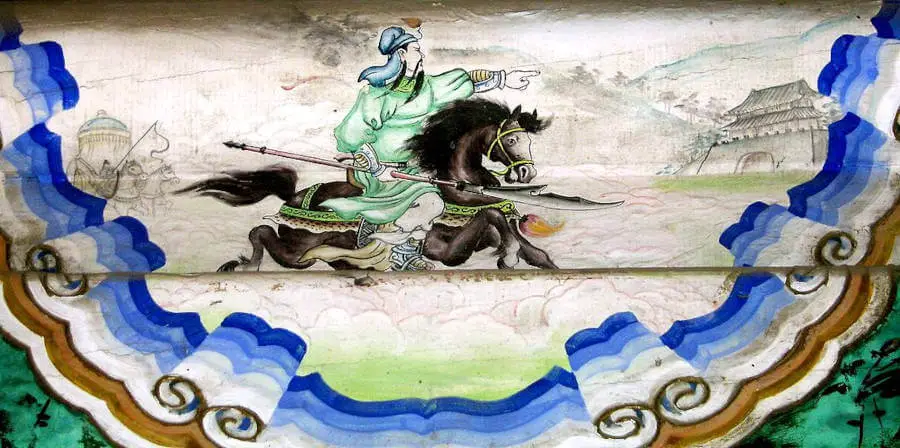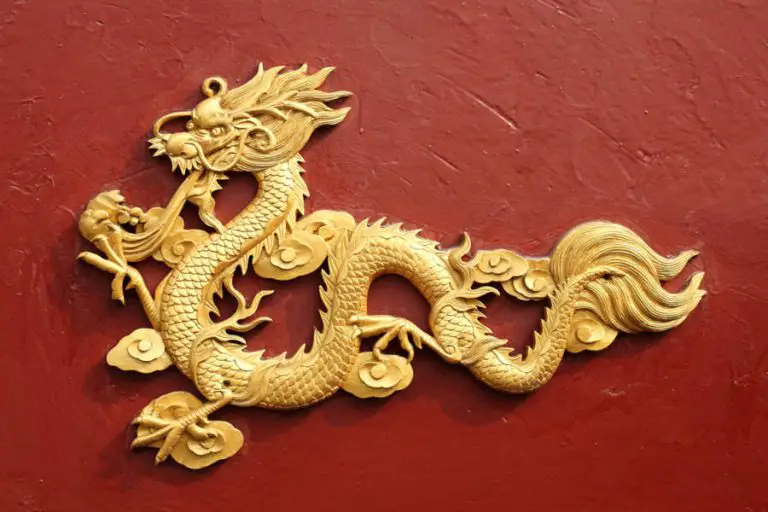Wealth deities have a unique place in the hearts of people in Oriental culture. The Tibetans refer to it as Jambhala; Koreans and Thais refer to it as Wealth Buddhas, and the Indians refer to it as Kubera. Chinese and Feng Shui practitioners, on the other hand, worship five wealth gods.
Guan Gong (also known as Guan Yu or Kuan Kung) is one of the Five Wealth Gods and is in charge of business and sales in the world of humans.
In this article, we’ll talk about the story behind Guan Gong, the most powerful expression of the Business God of Wealth.
Who is Guan Gong?
Guan Gong (關公)(Kwan Kung, Kuan Kong) is a Chinese god of war, and he is known for being very powerful. People who let the Kwan Kung into their homes or workplaces believe that he gives them both status and protection. Businessmen seeking power or equality frequently seek his assistance.
The origins of Guan Gong’s powers may be traced back to a story about China’s most formidable warrior. His real name was Kuan Di, and he lived from 160 to 220. He was a hero on the battlefield and in his own country.
He became recognized as a sacred defender by emperors, legislators, business people, and his soldiers after several triumphs and great actions. He was given the name Guan Gong, which means “god of war,” because he had so many honors.
Given his ability to grant equality, Kwan Kung is well recognized for standing up for the innocent and the virtuous. People say that you should keep Kwan Kung to protect yourself from thieves and evil spirits. People believe that this symbol will protect property and stop any bad or unlucky plans from ever coming true.
The Legend of Guan Gong
He was a general who served under the great warlord Liubei (劉備) near the end of the Eastern Han Dynasty and was recognized for his unwavering determination to restore the Han Dynasty’s greatness.
Due to his strategic brilliance, outstanding physique, and strong moral principles, Guan Gong gained a solid reputation as one of the most fearsome generals of all time. He is greatly appreciated by his colleagues for his loyalty and righteousness, which are extremely rare virtues, particularly in difficult and hard times.
Guan Gong was revered as the Martial Wealth God as early as the Sui Dynasty, a god commonly worshiped by generals and emperors to pray for victory in battles and conflicts. In history books, many Chinese emperors and generals talk about how the miracles of Guan Gong helped them get through tough times and win their battles.
During the Ming Dynasty, Emperor Yong Le said that he was able to get rid of Emperor Jianwen because Guan Gong had blessed him. As a devout follower of Guan Gong, Emperor Yong Le also had a lot of success with his ambitious plans to fix the fragile economy and stop the population from falling after Emperor Jianwen was overthrown.
In the late 16th century, Koreans prayed to Guan Gong and were successful in repelling a tremendous invasion of Japanese forces headed by Toyotomi Hideyoshi, one of Japan’s most respected generals. The fact that the Korean military campaigns were successful despite all odds is a strong sign of Guan Gong’s great divine power.
Related Reading: “Sanxing” – The Trinity of Luck and Happiness in Chinese Culture and Feng Shui – Opens in new tab
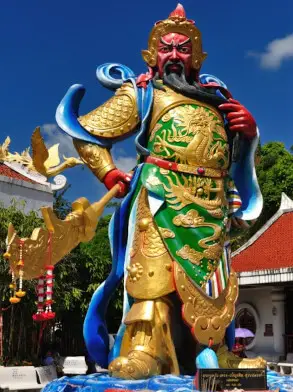
By the time the Qing dynasty ended in 1912, Guan Yu may have been more famous than Confucius himself. Confucius has been deified in just one of the country’s three major religious systems: Confucianism, Buddhism, and Taoism. By contrast, supporters of all three admire Guan Yu: He is known as a “sage” by Confucians, “Holy Ruler Deity Guan” by Taoists, and “Sangharama Bodhisattva” by Buddhists.
In today’s world, business is a form of warfare. Because of this, a lot of Chinese businesspeople and salespeople pray to Guan Gong regularly, asking him to help them make big sales and profit breakthroughs.
At the same time, Guan Yu became a type of patron saint or guardian deity for everyone from blacksmiths and opera artists to police officers (he is featured in public-serving institutions of authority, such as police stations and government buildings). Guan Yu is not only popular as a warrior. When so many merchants began to worship him, he became one of China’s five gods of prosperity.
Guan Yu was also an important character in “Romance of the Three Kingdoms,” which was written by Luo Guanzhong at the end of the Yuan Dynasty (1279–1368). In the novel, the stories of Guan Yu’s adventures were told in a romantic way.
Take a look at some Feng Shui product ideas – Aff.link
What are the meanings of Guan Gong in different depictions?
There’s no other god with a better track record than Guan Yu, who can protect you and your wealth. Therefore, Guan Gong sculptures, figurines, and paintings are popular office decor items for businesses to exhibit in order to fend off bad luck and prevent unintentional profit loss.
A statue of Guan Yu often has a red face, which stands for loyalty, and his weapon, the Green Dragon Crescent Blade, in his hands. The scarier he is portrayed as the more powerful he is.
There are three main versions of Guan Gong: Literati Guan Gong (sitting with a book), Martial Guan Gong (standing with a sword), and Victorious Guan Gong (riding a horse with his sword).
1. Literati Guan Gong
A statue of Guan Gong seated and reading represents academic accomplishment and professional growth. It’s perfect for businessmen who are in charge of business strategy, consulting, and strategic advisory. But a literate general who knows a lot about strategies is not enough to win a war. Execution is also very important.
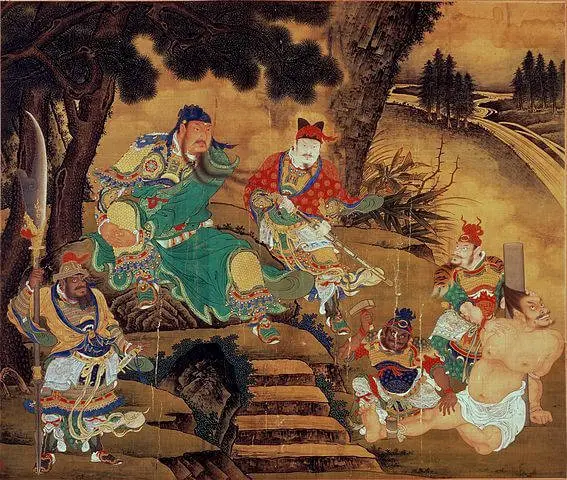
2. Martial Guan Gong
A statue of Guan Gong holding a sword in a standing position is the perfect choice for sales professionals who want to see a modest but consistent increase in sales. Similar to the above, a strong martial general is not enough to win wars and battles since strategic thinking is crucial.
His sword’s tip direction has different meanings.
- A statue of Guan Gong standing with his blade pointed upward represents the home is protected.
- A statue of Guan Gong standing with his sword pointing down means that evil spirits (disease, problems, etc.) are being driven out of the house.
3. Victorious Guan Gong
The most powerful version of Guan Gong is Victorious Guan Gong, which shows Guan Gong welding his powerful sword and riding on a Champion Stallion, the ultimate symbol of victory and huge breakthroughs. This is the only version of Guan Gong that possesses both strategic acumen and a great physique.
According to legend, Guan Gong was unbeatable and unrivaled when he rode on the Champion Stallion. This gave him the power to eliminate the defenses of five of the toughest cities and kill six of the most powerful generals of their time.
His Green Dragon Sword clears away obstacles on your way to success, making it easier for you to get past them.
A statue of Guan Gong on a horse means that success will come right away. Thus, it is often given as a gift.
Related reading: Caishen – The Chinese God of Wealth and His Role in Chinese Culture and Feng Shui– Opens in new tab

Where should Guan Gong be placed according to Feng Shui?
Here are some Feng Shui placements to make the most of the Guan Gong’s powers:
- Facing the front door (for business): It is considered that putting a Guan Gong here will protect against theft and fraud. It will encourage your employees to be honest and loyal. With the assistance of Guan Gong, your business is supposed to be safe and prosperous. When put at the home’s main door, Guan Gong will deter visitors with bad or malicious intent and prevent any “sha chi” or poison arrow-killing energy.
- Increase the power of the Guan Gong by putting it in your home’s northwest corner. In an office, just put the Guan Gong behind your desk, facing out. This is suggested for businessmen or businesswomen who are in charge.
- Place Guan Gong at the northwest corner of your house or business to attract and cultivate mentor luck, or “Gui Ren”. This kind of luck brings you a great helper from a higher place in life who can help you get where you want to go. The confidence and success of Guan Gong help those who want to be leaders and welcome those who are already leaders.
- Should be placed at an auspicious height, but not below the knees.
- Always put a Guan Gong statue in a place of respect. Don’t put it in the bathroom, bedroom, or other yin energy space. But keep in mind that praying to him is not required.
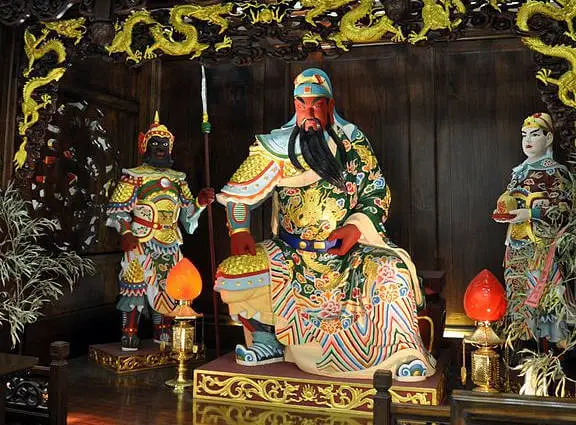
Guan Yu (關羽) Facts
- Guan Yu’s birthday is on the 24th of the sixth lunar month.
- Guan Yu’s children are Guan Xing, Guan Ping, and Guan Feng.
- His weapon is the Green Dragon Crescent Blade.
- Guan Yu was loyal to Liu Bei (State of Shu) and fought against Cao Cao (State of Wei), Sun Quan (State of Wu), and Lü Bu.
- One of the strange things Guan Yu did was to help both Liu Bei, his longtime leader and friend, and Cao Cao, the leader of their enemies.
- Cao Cao had once captured Guan Yu. Guan Yu was so highly respected by Cao Cao that instead of executing him, he named him a general.
- Guan Yu triumphed at the Battle of Baima for Cao Cao. In an effort to convince Guan Yu to stay, Cao Cao gave him a variety of rewards. Guan Yu, however, remained unaffected and finally returned to Liu Bei.
- Cao Cao’s army was trapped by a flood as a result of continual heavy rain. Guan Yu took advantage of the chance to order his army to attack by boat.
- Guan Yu started the Battle of Fancheng. This combat demonstrated Guan Yu’s might and strength, but it also resulted in Guan Yu’s death.
- There are three tombs for Guan Yu. His head was buried in Luoyang, his body was buried in Dangyang, and a cenotaph for Guan Yu was built in Chengdu.
- Guan Yu’s head is buried at the Guanlin Temple in Luoyang. After Sun Quan killed Guan Yu, his head was sent to Cao Cao as a tribute and to shift the blame. Cao Cao provided Guan Yu with a hero’s funeral.
- Cao Cao ordered the burial of a wooden body alongside Guan Yu’s head so that his corpse would be whole. Cao Cao also used this circumstance to dissolve the alliance between the States of Wu and Shu.
- Sun Quan gave Cao Cao the head of Guan Yu and buried Guan Yu’s body in Dangyang like a duke.
- The Shu State built the tomb of Guan Yu in Chengdu, which is a cenotaph so that Guan Yu could be worshiped there.
- Thousands of Guan Gong temples, with the names Guan Di Temple or Wu Miao (Warrior Temple), were established. The largest is the Guan Di Temple in Haizhou, where Guan Yu was born.
- It is said that every police station in Hong Kong has a shrine for him. Additionally, he is the patron deity of gang and triad members.
- The world’s biggest bronze statue of Guan Yu was in Jingzhou. It was 190 feet (58 meters) tall and weighed 1,200 tons. Due to its size exceeding the new construction rules, it has to be removed. The monument will be moved to a suburban location in the city of Dianjiangtai, in accordance with the rectification plan (2021). The total cost of the project is 155 million yuan ($26.33 million).
Related reading: Guanyin: The Goddess Who Listens to the Cries of the World – Opens in new tab
Stay in Touch
 Join our newsletter by using the forms on this website or click here!
Join our newsletter by using the forms on this website or click here! Follow us on Google News
Follow us on Google News Follow us on Facebook
Follow us on Facebook
Featured Image by Shizhao from Wikimedia Commons (CC BY-SA 1.0)

